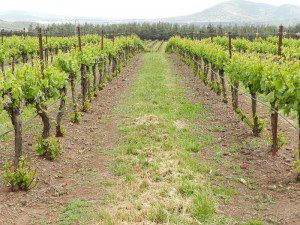
(Wikimedia CC; click to enlarge)
Isaiah can be confusing, daunting, intimidating. But his eloquence astonishes, and he’s remarkably quotable. Which is why he’s the most quoted prophet in the New Testament. And in the Book of Mormon. And in the Dead Sea Scrolls. He is, as Elder Bruce McConkie once termed him, “a prophet’s prophet.”
There are many interesting aspects to today’s reading, 2 Nephi 15 (= Isaiah 5), but I’ll pick up briefly on just a few.
1.
The idea of comparing Israel to a vineyard or an orchard is common in scripture. See, for instance, Jacob 5 in the Book of Mormon and the “parable of the wicked husbandmen” in the three synoptic gospels, as well as Paul’s image of the olive tree in Romans 11.
2.
Isaiah’s concern for “social justice,” as it’s often — though, in my view, misleadingly — described today, is apparent in this chapter and elsewhere. It’s an important element of his prophetic message, and, despite their importance, it should not be overlooked in order to focus on his messianism and his predictions of dispersion, restoration, and the last days.
Thus, for instance, in verse 7, he laments the oppression that prevails in Judah. (Judgment, in this verse, should probably be rendered as justice.)
In verse 8, he criticizes greedy and acquisitive materialism. While the poor live in hovels, the rich — who, remember, probably gained their wealth in his society through political power and connections more than through hard work, productivity, and free exchanges — build ever bigger and more numerous houses, far beyond their needs.
In verses 11 and 12, he takes aim at hedonism, a focus on thoughtless and unreflective pleasure, an obsession with partying that prevents giving heed to truly important things.
3.
In verse 19, Isaiah goes after those who’re waiting for proof. They won’t commit to living faithfully until God proves himself to them on their terms.
4.
Many of the prophet’s criticisms seem uncannily contemporary. They fit our morally untethered, self-centered, materialistic, pleasure-focused culture with chilling accuracy. And no portion of the chapter, perhaps, fits us better than verses 20 and 21. Which should — and would, if we were thoughtful — lead us to reflect on the judgments promised later in the chapter.
With the so-called “Islamic State” and al-Qa‘ida constantly in the news, faced off against the ever more amoral and effete West, one is reminded of the horrifying opening lines of William Butler Yeats’s famous poem “The Second Coming”:
Turning and turning in the widening gyre
The falcon cannot hear the falconer;
Things fall apart; the centre cannot hold;
Mere anarchy is loosed upon the world,
The blood-dimmed tide is loosed, and everywhere
The ceremony of innocence is drowned;
The best lack all conviction, while the worst
Are full of passionate intensity.











